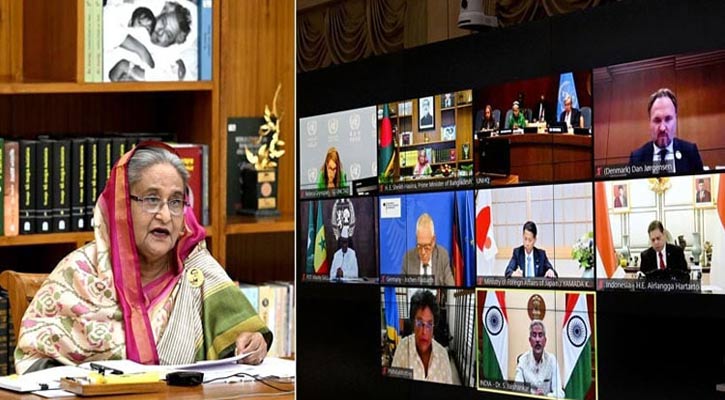Prime Minister Sheikh Hasina said that in this time of increasing instability, international cooperation is necessary to build tolerance for the weak among the global community to face future challenges.
Prime Minister Sheikh Hasina said these things while addressing the Global Crisis Response Group (GCRG) virtually on Friday (July 21).
Reiterating the urgent need to end the ongoing war in Ukraine, the Prime Minister said the protracted war and imposed sanctions and counter-sanctions continue to destabilize the world. Every day of war takes and destroys many lives in conflict zones and far corners of the world.
He added, “Unfortunately, as we contemplate today the growing crisis and the devastating impact on humanity, the conflict in Ukraine continues.” In fact, new sophisticated weapons are being used in warfare every day which are causing more destruction and severely affecting the lives of people around the world. Poverty and inequality are increasing sharply and the debt burden of poor countries is increasing.
The Prime Minister said that Bangladesh, as an energy and food importing country, is suffering from rising import costs, inflation and pressure on foreign exchange reserves. We urgently need a reformed international financial framework that will provide financing to least developed and developing countries with unconditional access to concessional, low-cost, low-interest funds.
Developing countries must have easy access to funds during crises and disasters, including equitable access to IMF SDR funds during emergencies. Besides, there should be access to funds from IFIs and MDBs at low interest rates. ‘
Factors that affect food prices and access—such as export restrictions, stockpiles and supply chain distortions—must be addressed, he said. In this context, we fully support the (UN) Secretary-General’s call to open markets, remove export restrictions and release food stocks.
The Prime Minister congratulated the UN Secretary General for the Black Sea Initiative and said it needs to be expanded to feed people and save lives. In addition to reducing imports through domestic energy mix and renewable energy, energy needs to be used judiciously.Our government supports the energy transition by providing policy support and encouraging local public and private investment in the energy sector and green energy transition.
Referring to the interconnectedness of food and energy security and climate change, Sheikh Hasina said in her fourth line of thought, burning fossil fuels accelerates climate change, which increases the frequency and severity of natural disasters. This in turn affects agriculture, food production and human displacement. A transition to sustainable energy, food production and climate action are therefore essential.
The Prime Minister said that our government has taken some steps to help the people in difficult times. It reveals some signs of turnaround in our economy which gives us a sense of relief. To get to this point we have to take some tough financial and policy decisions, among other decisions we have to limit our imports of non-essential and luxury goods.Key subsidies in the energy sector had to be withdrawn, overall spending in the public sector had to be reduced, a US$4.7 billion loan package from the IMF had to be negotiated as a precautionary measure. We have to encourage people to produce food without leaving any fallow land uncultivated. We have seriously ensured that no person suffers from food shortage.
At this time, United Nations Secretary General Antonio Guterres gave a welcome speech to the virtual discussion moderated by UNCATAD Secretary General Rebecca Greenspan.
Senegalese President Macky Sall, Bangladesh Prime Minister Sheikh Hasina and Barbados Prime Minister Mia Mottley spoke as priests.
In addition, Indonesia’s Minister of Economic Coordination also Hartato, India’s Foreign Minister. Subraniyam Jaishankar, Denmark’s Minister for Development Cooperation and Global Climate Affairs Dan Jørgensen, Japan’s Minister of State for Foreign Affairs Yamada Kenji and Germany’s Federal Minister for Economic Cooperation Jochen Flashbarth spoke as observers.

